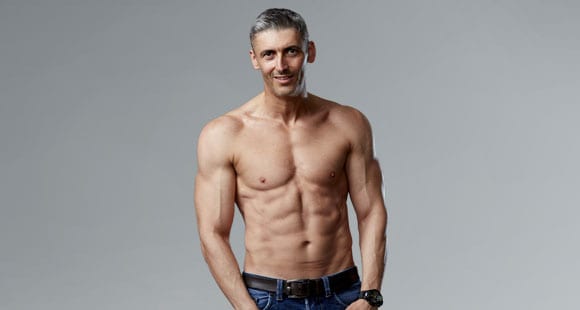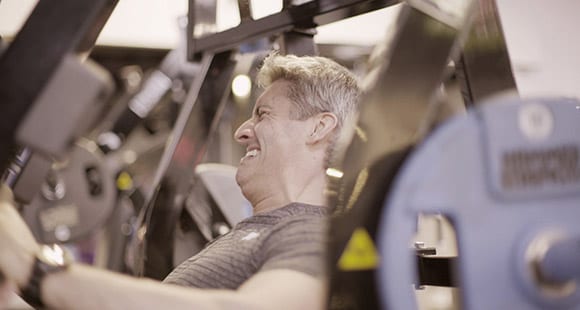
Ben Jackson’s Story
Transforming with Vitality
Following the creation of Vitality, we wanted to show exactly how active men can integrate our advanced health supplements into their everyday life to improve overall health, and help you obtain the look you’ve always wanted.
Myprotein approached Ben Jackson at his local gym with an invitation to follow a 12-week programme, combining tailored exercise, diet plans and our Vitality supplement range. He agreed and allowed us to document his stunning transformation week after week for you to see.
Take a look at his stunning results, and learn how you can follow in Ben’s footsteps on the path to looking and feeling great, regardless of age and whatever life throws at you.

| Date | Weight |
| 16.01.17 | 86.5kg |
| 23.01.17 | 86.5kg |
| 30.01.17 | 85kg |
| 06.02.17 | 85kg |
| 13.02.17 | 85kg |
| 20.02.17 | 85kg |
| 27.02.17 | 85kg |
| 06.03.17 | 85kg |
| 13.03.17 | 84kg |
| 20.03.17 | 82kg |
| 27.03.17 | 81kg |
| 3.04.17 | 80.5kg |
| 10.04.17 | 79kg |
After Completing the 12 Week Programme

Ben’s Diet Plan
As part of Ben Jackson’s Vitality journey, he was placed on a diet that helped transform his body – allowing him to lose fat, gain muscle, and recover properly, while integrating important nutrients, vitamins and minerals into his everyday routine for a healthier lifestyle.
Take a look below to see an example of how Ben was eating to achieve his goals, before following our easy steps for calculating your own daily requirements to stay active and healthy.
Ben Jackson
Age: 46
Weight before transformation: 87kg
Click HERE to follow Ben's weekly diet plan.
The Basics: Calculating Energy Requirements
Basal Metabolic Rate
To calculate how much energy (calories) you need to consume per day, you first have to calculate your basal metabolic rate (BMR), which is the amount of energy used by the body while resting. One of the most commonly used equations to calculate BMR is the Schofield equation, calculated for men as follows.

How To Calculate Your BMR
| Age (years) | Equation (kcal per day) |
| 30–60 | 11.472 × weight (kg) + 873.1 |
| Over 60 | 11.711 × weight (kg) + 587.7 |
Average BMR For Men Aged 30-60
| Weight (kg) | BMR (calories needed per day while resting to maintain weight) |
| 60 | 1561 |
| 70 | 1676 |
| 80 | 1790 |
| 90 | 1905 |
| 100 | 2020 |
| 110 | 2135 |
| 120 | 2249 |
(plus or minus 167kcal)
Average BMR For Men Aged 60+
| Weight (kg) | BMR (calories needed per day while resting to maintain weight) |
| 60 | 1290 |
| 70 | 1407 |
| 80 | 1524 |
| 90 | 1641 |
| 100 | 1758 |
| 110 | 1875 |
| 120 | 1993 |
(plus or minus 164kcal)
Those with lower body fat and higher muscle mass, as well as people at the younger end of the age scales, require more energy than those that are obese or at the older end of the age scale.
Ben’s BMR = 1871kcal per day

Total Daily Energy Expenditure
Next is to calculate your total daily energy expenditure, which is the total amount of calories you should consume each day to maintain your current weight. This is based on your BMR and the amount of physical activity you carry out on a day-to-day basis, as follows:
» Sedentary people should multiply their BMR by 1.3 (very physically inactive)
» Lightly active men should multiply their BMR by 1.6 (daily walking or intense exercise 1-2 times per week)
» Moderately active men should multiply their BMR by 1.7 (intense exercise for 20-45 minutes at least 3 times per week)
» Very active men should multiply their BMR by 2.1 (intense exercise for at least an hour every day)
» Extremely active men should multiply their BMR by 2.4 (athlete or extremely demanding job such as the armed forces)
Ben’s TDEE = 3180kcal per day
Fat Loss
To lose fat, the body requires a calorie deficit. This means eating less than your body uses, forcing it to use up your fat stores for energy. Having a calorie deficit of 500kcal per day is considered to be enough to lose half a kilogram of fat per week.
Ben’s calorie requirement to reduce fat stores = 2680kcal per day
Remember though, your fat stores aren’t the only source of energy the body will use when it isn’t getting enough energy from your diet, meaning you can lose muscle, too. It’s vital to consume enough protein to minimise muscle loss during periods of weight loss.

The Nitty-Gritty: Calculating Protein, Carbohydrate & Fat Requirements
Tip: Try to spread your protein, carbohydrates and fats relatively evenly throughout meals.
Protein
It’s generally accepted that to increase muscle mass, you should consume anywhere between 1.5g and 2.5g of protein per kilogram of total bodyweight per day. There are around 4 calories in 1g of protein.
Ben’s protein requirements based on 2.5g of protein per kg of bodyweight = 218g per day
(218g of protein= 870kcal)
Tip: Try to flavour your meat or other sources of protein with herbs and spices rather than sauces and condiments to avoid unnecessary fat and sugar. Tip: Make sure you consume protein and carbohydrates after your workout to aid muscle growth and replenish muscle glycogen stores (carbohydrate stores).
Fat
It’s commonly recommended that you should consume around 0.8g of dietary fat per kilogram of total bodyweight per day. There are around 9 calories in 1g of fat.
Ben’s fat requirements = 70g per day
(70g of fat = 630kcal)
Tip: Oily fish is a great source of omega-3 fatty acids, which are great for maintaining optimum cardiovascular and brain function, so make sure you eat a minimum of 2 portions of oily fish per week.

Carbohydrates
Carbohydrates are a major source of energy and should make up the remaining calories of your total daily energy expenditure after protein and fat. There are around 4 calories in 1g of carbohydrate.
Ben’s carbohydrate requirements = 295g per day
(295g of carbohydrates = 1180kcal)
Tip: If you’re trying to reduce your fat stores, reduce your carbohydrate intake by 20-50% on rest days.
Our articles should be used for informational and educational purposes only and are not intended to be taken as medical advice. If you're concerned, consult a health professional before taking dietary supplements or introducing any major changes to your diet.








